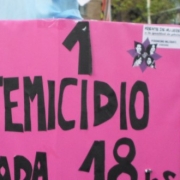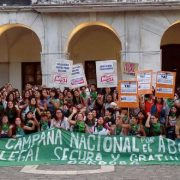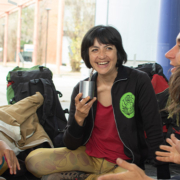Update of the national protocol for the Legal Interruption of Pregnancy
An update of the National Protocol for the comprehensive care of people entitled to legal termination of pregnancy was published yesterday in the Official Gazette.
“Below, we offer a google translate version of the original article in Spanish. This translation may not be accurate but serves as a general presentation of the article. For more accurate information, please switch to the Spanish version of the website. In addition, feel free to directly contact in English the person mentioned at the bottom of this article with regards to this topic”.
The Ministry of Health of the Nation approved by Resolution N ° 3158/2019 the third update of the guide that contains the guidelines and standards of care for cases of abortions allowed by law. The first protocol was prepared in 2007, and was updated in 2010 and 2015, where it incorporated the provisions made by the Supreme Court in the FAL ruling of 2012.
On this occasion, the update was carried out in the light of the new Civil and Commercial Code, which was sanctioned in 2015, particularly with regard to minors and persons with disabilities. In addition, it contains the latest recommendations regarding medical procedures recommended by the World Health Organization.
Main topics
The Protocol aims to “guarantee the dignity and rights of every person capable of gestating and, therefore, potential subject to the right to ILE, when his life or health is in danger, or is taking a pregnancy as a result of a violation, regardless of whether he is a person with or without a disability. ”
It is based on the principle of autonomy of people, so it requires informed consent from those who require access to practice. On consent, the new protocol introduces some new features:
Children and adolescents:
- “All girls, that is, under 13 years of age, may give their consent with the accompaniment of their parents, legal representatives, people who formally or informally exercise care roles,“ close friends ”or affective referents. These must participate jointly with the girl in the decision-making process and must sign confirming the girl’s informed consent. The principle of progressive autonomy should guide the actions of the health team and the accompanying adults. If there is an unjustified refusal of their parents, guardians or in charge of accompanying the decision of the girl, the conflict between both parties must be resolved from the health team taking into account the best interest of the girl and her ability to decide based on development of its progressive autonomy. The integral health assessment should consider the increased risks associated with pregnancies at these ages and the possible consequences of carrying out the practice or not. ”
- Teenagers from 13 to 16 years old can consent autonomously, that is, without the consent of their parents being necessary. Only in cases where a procedure involving an act considered to be invasive (which may endanger your health or your life) should be used, will the consent of your parents, legal representatives, people who formally or informally exercise care roles be necessary, “close” people or affective referents. This assent implies the accompaniment of the decision of the right holder, that is, the adolescent.
- “All persons 16 years of age or older are considered by Argentine law as adults in relation to the care of their own body. Therefore, they can give themselves informed consent and personally make and sign the affidavit required for the termination of a pregnancy resulting from a rape (if applicable) without requiring the consent of their parents or legal representatives. “
In addition, the protocol foresees the application of the principles of progressive autonomy (it is the development in time of the capacity for decision-making. This principle must be taken into account to encourage the participation of girls and boys in decision-making ) and of the best interest of girls, boys and adolescents (it is the maximum satisfaction, integral and simultaneous of their rights and guarantees).
In the cases of children and adolescents victims of rape, the protocol clarifies that justice should only intervene to protect them from the situation and for the punishment of those who committed the abuse, but this situation should not constitute an obstacle for them to access to practice It is not a requirement that justice be consulted or a judicial authorization is requested for the interruption, since it is a responsibility of the health teams and is made at the request of the patient.
- Persons with disabilities: the protocol provides for the informed consent of persons with disabilities, clarifying that they have the same right as persons without disabilities to access the practice. To do this, it indicates that a support system can be requested to facilitate decision making. It also indicates that in cases where there is a current judicial sentence of capacity restriction, the terms of the same should be asked, since it may contain the designation of support systems for health decisions.
The situation in the provinces
The FAL ruling, in 2012, urged the national State and the provincial states to provide the necessary conditions to carry out the legal interruptions of pregnancies in a fast, accessible and safe way. In this regard, it required that they develop hospital protocols “for the specific care of abortions not punishable in order to remove all administrative or factual barriers to access to medical services.”
Currently, there are 6 jurisdictions that dictated their own protocols: Chubut, Autonomous City of Buenos Aires, Neuquén, Río Negro, Buenos Aires and Córdoba. In the latter province, however, it was suspended by a legal action filed by the Portal de Belén organization to prevent its application. Fortunately, the lawsuit ended this year, resolving the dispute over its constitutionality and its validity.
The provinces that adhered to the National Protocol are 11: Jujuy, La Rioja, La Pampa, Misiones, Salta, Santa Cruz, Santa Fe, Tierra del Fuego, Entre Ríos, Chaco and San Luis. Your membership is still valid, even after the update.
Unfortunately, there are still 7 provinces that do not have their own regulations or adhere to the Nation’s protocol, and these are Santiago del Estero, Tucumán, Corrientes, Mendoza, San Juan, Formosa and Catamarca.
In this context, it is clear that the right of women, girls, adolescents and any person with the ability to gestate to access the legal interruption of pregnancy (ILE) in the cases provided by law is still very difficult and still faces numerous obstacles .
In addition to the effective implementation of this updated protocol, throughout the national territory, it is necessary to continue advancing in the recognition of rights, towards the decriminalization of abortion and the legalization of voluntary termination of pregnancy.
Contact
Mayca Balguer, maycabalaguer@fundeps.org






